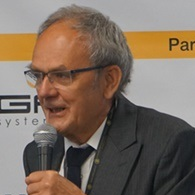Mathematical Modelling and Performance Optimization of Gas Turbines and Combined Cycle Power Plants
A special issue of Applied Sciences (ISSN 2076-3417). This special issue belongs to the section "Energy Science and Technology".
Deadline for manuscript submissions: closed (30 April 2022) | Viewed by 5621
Special Issue Editors
Interests: power engineering; combined heat and power; combined cycle power plant; energy storage; thermal energy storage; mathematical modelling; thermal processes; micro-cogeneration; fuel cells; energy systems
Special Issues, Collections and Topics in MDPI journals
Interests: combined cycle power plant; environmental protection; mathematical modelling; thermal processes; gas turbines optimization; steam turbines
Special Issue Information
Dear Colleagues,
Due to the growing demand to reduce emissions of carbon dioxide and other substances into the atmosphere, new methods of effective generation of electricity and heat are continually being sought. Recently, there has been substantial investment in renewable energy sources, but non-renewable sources, connected to national grid units, such as gas turbines, combined cycle power plants and coal-fired power plants still have a large share of electricity production. Combined cycle systems can be treated as highly efficient sources of electricity generation. Modern technologies enable the construction of units with an efficiency of over 62%, which makes them one of the most efficient installations in the energy sector.
There are more and more concepts of cooperation between gas turbines and combined cycle systems with other sources of energy generation, such as fuel cells and renewable sources. Hybrid systems configured in this can possibly achieve even higher efficiencies than those operating separately.
Large-scale energy and heat storage is also a challenge. Combined cycle power plants operate most efficiently when they operate at their nominal power parameters. Notably, the demand for electricity and heat varies over time. Therefore, an in-depth analysis of the cooperation of gas turbines and combined cycle systems with heat and electricity storage is pertinent.
This Special Issue entitled “Mathematical Modelling and Performance Optimization of Gas Turbines and Combined Cycle Power Plants” will present various aspects of the most recent advancements related to gas turbines and combined cycle technology.
Authors are invited to submit papers dealing with all aspects of mathematical modelling of thermal cycles, model validation, analysis of operation and optimization of gas turbines and combined cycles, environmental impact, cooperation of different energy sources with gas turbines and combined cycles (so-called hybrid cycles), energy storage in relation to gas turbines and combined cycles and energy and exergy analysis.
Dr. Marcin Wołowicz
Prof. Dr. Krzysztof Badyda
Guest Editors
Manuscript Submission Information
Manuscripts should be submitted online at www.mdpi.com by registering and logging in to this website. Once you are registered, click here to go to the submission form. Manuscripts can be submitted until the deadline. All submissions that pass pre-check are peer-reviewed. Accepted papers will be published continuously in the journal (as soon as accepted) and will be listed together on the special issue website. Research articles, review articles as well as short communications are invited. For planned papers, a title and short abstract (about 100 words) can be sent to the Editorial Office for announcement on this website.
Submitted manuscripts should not have been published previously, nor be under consideration for publication elsewhere (except conference proceedings papers). All manuscripts are thoroughly refereed through a single-blind peer-review process. A guide for authors and other relevant information for submission of manuscripts is available on the Instructions for Authors page. Applied Sciences is an international peer-reviewed open access semimonthly journal published by MDPI.
Please visit the Instructions for Authors page before submitting a manuscript. The Article Processing Charge (APC) for publication in this open access journal is 2400 CHF (Swiss Francs). Submitted papers should be well formatted and use good English. Authors may use MDPI's English editing service prior to publication or during author revisions.
Keywords
- Mathematical modelling
- Combined cycles
- Gas turbines
- Steam turbines
- Optimization
- Performance analysis
- Hybrid cycles
- Environmental protection
- Emission reduction
- Energy systems
- High capacity energy storage
- Combustion
- Thermal cycles
- Thermodynamic analysis
- Energy and exergy analysis






